Most people are aware of the importance of the healthy bacteria for proper digestion. But did you know that each part of your body is home to a unique community of microbes? In fact, according to the University of Utah's Genetic Science Learning Center, the microbes' genes that live in or on your body outnumber the human genes by about 100 to 1. And although it's true that some microbes can be harmful, most bacteria that live in or on your body are vital to your health. Here's what else you should know.
Why Are Healthy Bacteria Important?
Bacteria are important for a myriad of reasons. For example, microbes in the large intestine produce vitamins that you can't make on your own, help you digest foods that you can't break down, and extract nutrients that would otherwise just pass through the digestive track. Friendly bacteria that live in your sinuses protect you from the cold and flu, and microbes that live on your skin keep it healthy and crack-free by protecting your skin from harmful substances.
Researchers have been studying microbes for years and the recent advancement in molecular technology has made it possible to identify and characterize many new species that live within humans. Scientists are also exploring different ways to use beneficial bacteria to treat health conditions such as asthma, allergies, autoimmune diseases, and many others.
4 Simple Rules to Follow
Eating a healthy, low-sugar diet can help support the health of your good bacteria. To further make sure your bacterial communities are thriving, follow these four simple rules:
Only Take Antibiotics When Absolutely Necessary
Antibiotics are an important drug and can save lives. However, using antibiotics can create an imbalance in your healthy bacteria colonies, which can lead to side effects such as diarrhea, a yeast infection, skin rashes, and other complications. Antibiotics kill all bacteria, including your resident healthy bacteria, so make sure to only take antibiotics when absolutely necessary and for a short period of time.
Avoid Using Antibacterial Products
According to U.S. Food and Drug Administration, there isn't enough evidence to prove that antibacterial soaps and washes are more effective in preventing illnesses than washing your hands with plain soap and water. The same applies to antibacterial surface cleaners. The microbes living in and on your body are influenced by the environment you live in, so constantly sanitizing your home could harm your good bacteria. Try to avoid buying antibacterial household cleaners and use natural alternatives, such as vinegar, baking soda, coarse salt, and hydrogen peroxide, instead.
Eat Foods That Contain Beneficial Bacteria
Healthy bacteria need regular replacement and support because they can easily be killed by stress, poor diet, and toxic chemicals. Eating foods that contain beneficial bacteria is a great way to support your bacterial colonies. Yogurt is a popular macrobiotic-containing food that is widely available in grocery stores. When shopping for yogurt, choose plain yogurt without added sugar. Also, make sure it contains live active bacteria. Other excellent sources of probiotics are kefir, cultured vegetables such as Sauerkraut, pickles, and kimchi, miso paste, and kombucha.
Eat More Plants
Plant-based foods help promote the health of your existing bacterial colonies by providing them with nutrients. For example, artichokes, leeks, onions, asparagus, and bananas are high in inulin, which is an insoluble fiber that supports microflora in your colon. Green leafy vegetables, such as spinach, kale, Swiss chard, collard greens, and others, help feed good bacteria by providing a unique sugar molecule called sulfoquinovose.
Although it's very important to follow basic hygiene and food safety rules, microbes are not something you should avoid at all costs. Instead, you should try to live in a balanced environment that supports the health of these tiny creatures, which can, in turn, help you live a healthier life.
Related Articles

The Basics of Brewing Kombucha
Here's a simple how-to guide on brewing kombucha at home, including what supplies to buy and the steps you need to take.

Exploring the Benefits of Probiotics
What are the benefits of probiotics and where can you find them? Here's what you should know.

5 Ways to Love Fresh Spinach
Easy, delicious spinach recipes put this power food to work for you throughout the day.
